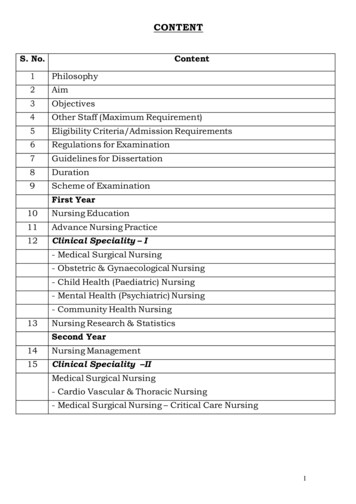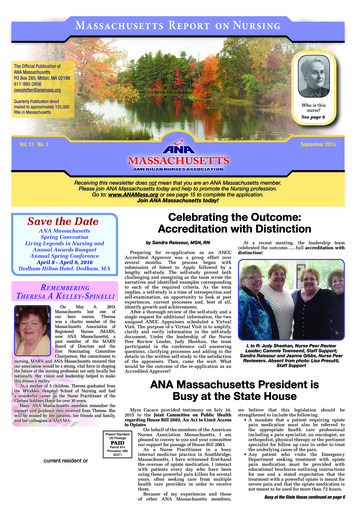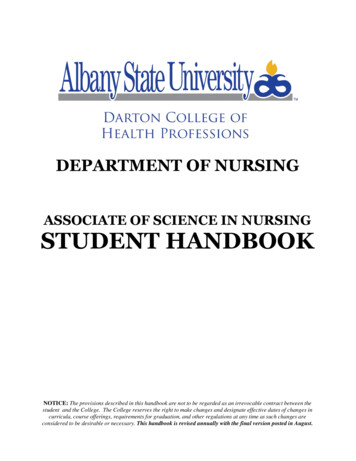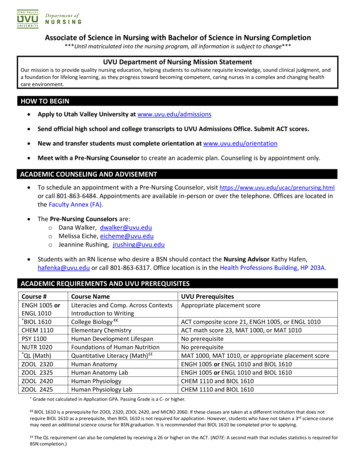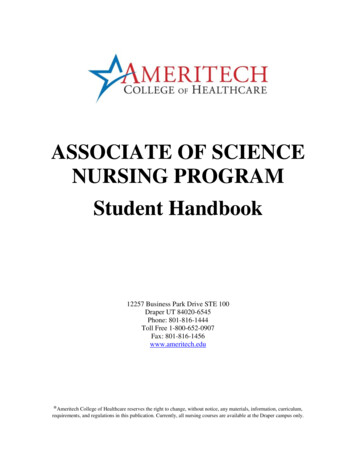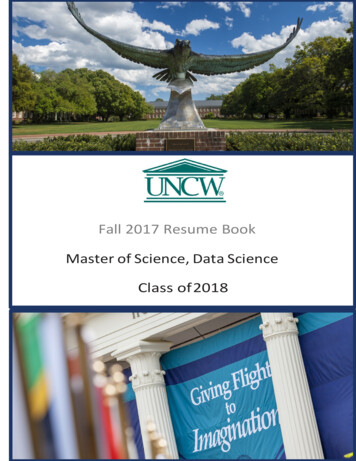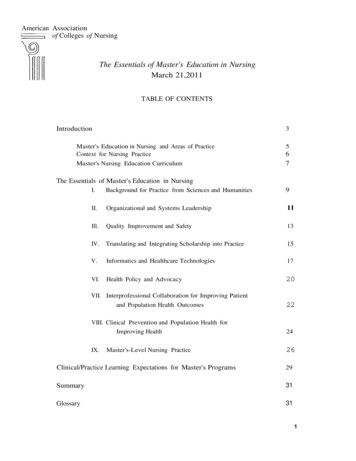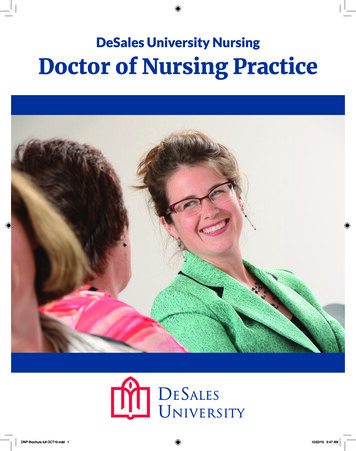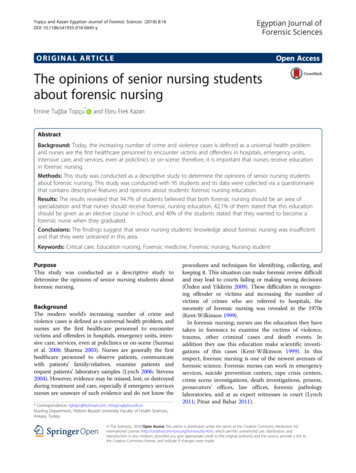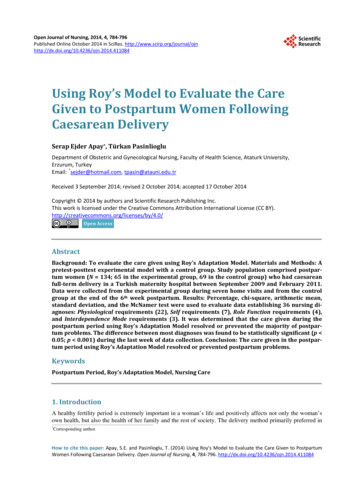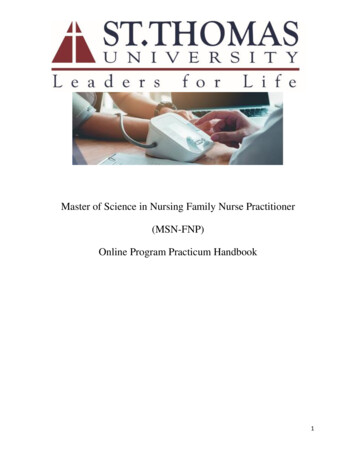
Transcription
Master of Science in Nursing Family Nurse Practitioner(MSN-FNP)Online Program Practicum Handbook1
Table of ContentsOverview . 3MSN FNP Student Outcomes . 3Course Overview . 4Course Failure. .4Clinical Course . 4Specialization Courses . 5Roles and Responsibilities . 5Student’s Role . 6Clinical Faculty Role . 7Preceptor Role . 7Overview of Requirements . 8Student Requirements . 8Preceptor Requirements . 10Clinical Site Selection Criteria . 11Clinical Policies . 12Clinical Documentation . 10Student Acknowledgement . 15Preceptor/Facilitator Agreement . 162
OverviewWelcome to the St. Thomas University Master of Science in Nursing (MSN) Family NursePractitioner (FNP) online program. This program will build on your educational and professionalexperience as a registered nurse and prepare you for advanced nursing roles. Our goal is toenable you to make significant contributions to the expansion of nursing research and to becomea health care provider to diverse populations. As a graduate, you will be prepared to take theFNP certification examination and be able to practice as a care provider for patients across thelifespan.MSN-FNP Student OutcomesIn this master's program, you will gain the confidence to make independent critical judgments atall levels of health care including health promotion, illness prevention, diagnosis andmanagement for individuals, families, and communities. St. Thomas University has establishednine essential student learning outcomes for this program. Each outcome will be covered withinthe framework of coursework and clinical instruction.1) Integrate advanced knowledge in nursing, related sciences, and leadership skills that willemphasize ethical and critical decision making to promote safe, high quality, cost-effective,and culturally appropriate care across a diverse setting.2) Incorporate evidence-based research to resolve practice problems and improve knowledge.3) Apply technology, such as informatics, to enhance patient care using a collaborativeapproach.4) Construct processes for self-accountability of professional growth, adopt lifelong learning,and practice safely and effectively within the chosen specialty to maintain health andimprove patient outcomes.5) Establish an environment of advanced practice that is conducive to the development ofeffective interactions with patients, other disciplines, and other entities in the communities.6) Advocate for policies that lead to improved health outcomes for populations andimprovement of the quality of the healthcare system at the local, state, national and globallevel.7) Demonstrate competence in communication, collaboration, and consultation to advance interprofessional teams.8) Integrate clinical prevention and health promotion strategies to maintain optimal health,improve patient health, and improve health outcomes.9) Apply advanced knowledge gained from nursing and other related science as a foundation forpractice.3
Course OverviewThe MSN-Family Nurse Practitioner online curriculum is comprised of 8 core courses (24 credithours) and 9 specialization courses (23 credit hours). Except for the practicum course, eachspecialization didactic course has an affiliated clinical course, which must be taken concurrently.Course FailureStudents who receive a grade of “B-, 82%” or lower on a course must repeat that course.However, a student may only repeat that course once. A student who receives a grade of “B-“ orlower after repeating the same course will be considered to have failed the course and will bedismissed from the program. Two separate course failures in the program will result in dismissalfrom the program. Student must pass BOTH the theory and the clinical portion of the course.Any student who does not pass the theory or the clinical portion must repeat both portions,regardless of if one portion was passedCore CoursesNUR 501: Philosophical & Theoretical, Evidence-Based Research Basis of NursingNUR 502: Advanced PathophysiologyNUR 504: Advanced Health AssessmentNUR 505: Diversity in Advanced Health PracticeNUR 506: Influencing Health PolicyNUR 512: Role Transition to Advanced Practice NursingNUR 600: Advanced Clinical PharmacologyNUR 601: Health Promotion & Disease Prevention4
Specialization CoursesDidactic CourseClinical CourseNUR 507:Advanced FNP: Children &Families*NUR 507CL:Advanced FNP: Clinical I125 Clinical Hours Required*NUR 514:Advanced FNP: Women’sHealth*NUR 514CL:Advanced FNP: Clinical II125 Clinical Hours Required*NUR 509:Advanced FNP: Adults*NUR 509CL:Advanced FNP: Clinical III125 Clinical Hours Required*NUR 612CL:Advanced FNP: Clinical IV125 Clinical Hours Required*NUR 612:Advanced FNP: AdultGerontology*NUR 611:Advanced Practice NursingIntegration* No Clinical Hours RequiredNUR 507 This course is a co-requisite of NUR 507 CL. The student must successfully pass NUR 507 CL to pass this course. Thefollowing courses must be taken prior to being enrolled in this course: NUR 501, NUR 502, NUR 504, NUR 506, 512, 600, and 601.NUR 507 CL This course is a co-requisite of NUR 507. The student must successfully pass NUR 507 to pass this course. Thefollowing courses must be taken prior to being enrolled in this course: NUR 501, NUR 502, NUR 504, NUR 506, 512, 600, and 601.NUR 509 This course is a co-requisite of NUR 509 CL. The student must successfully pass NUR 509 CL to pass this course. Thefollowing courses must be taken prior to being enrolled in this course: NUR 501, NUR 502, NUR 504, NUR 506, 512, 600, and 601.NUR 509 CL This course is a co-requisite of NUR 509. The student must successfully pass NUR 509 to pass this course. Thefollowing courses must be taken prior to being enrolled in this course: NUR 501, NUR 502, NUR 504, NUR 506, 512, 600, and 601.NUR 514 This course is a co-requisite of NUR 514 CL. The student must successfully pass NUR 514 CL to pass this course. Thefollowing courses must be taken prior to being enrolled in this course: NUR 501, NUR 502, NUR 504, NUR 506, 512, 600, and 601.NUR 514 CL This course is a co-requisite of NUR 514. The student must successfully pass NUR 514 to pass this course. Thefollowing courses must be taken prior to being enrolled in this course: NUR 501, NUR 502, NUR 504, NUR 506, 512, 600, and 601.NUR 612 This course is a co-requisite of NUR 612 CL. The student must successfully pass NUR 612 CL to pass this course. Thefollowing courses must be taken prior to being enrolled in this course: NUR 501, NUR 502, NUR 504, NUR 506, 512, 600, and 601.NUR 612 CL This course is a co-requisite of NUR 612. The student must successfully pass NUR 612 to pass this course. Thefollowing courses must be taken prior to being enrolled in this course: NUR 501, NUR 502, NUR 504, NUR 506, 512, 600, and 601.NUR 611 The following courses must be taken prior to being enrolled in this course: NUR 501, NUR 502, NUR 504, NUR 506, 512,600, 601, NUR 507, NUR 507 CL, NUR 509, NUR 509 CL, NUR 514, NUR 514 CL, NUR 514, and NUR 514CL.5
Clinical CoursesStudents are required to complete a total of 500 clinical hours to graduate from the program.There are 4 clinical courses with 125 clinical hours required for each of these classes. Eachclinical course runs over an 8-week period, and the required hours must be completed by the endof each course.Roles and ResponsibilitiesStudent’s Roles and Responsibilities Students are responsible for securing a preceptor during each clinical course*. If apreceptor is not approved, you will be responsible for submitting another choice.Students will understand and practice within the scope of advanced nursing practiceas regulated by the Nurse Practice Act in the state where clinical experiences will becompleted.Students must familiarize themselves with existing clinical site protocols andregulations.Students must come prepared for clinical by bringing a stethoscope and reviewingcourse learning objectives, reading the course textbook(s) and professional journals,and reviewing other audiovisual and electronic learning aids.Students must be available and prepared for a site visit by St. Thomas Universityclinical faculty Monday through Friday during daytime hours.Students are responsible for communicating questions &/or concerns with theirpreceptor and clinical faculty regarding their clinical experiences.Students are expected to complete assignments on time and meet the objectives of thecourse.*STU strongly encourages students to secure their own preceptors, as this is the best way to accommodate a clinicallocation and schedule to your needs. If assistance with clinical placement is needed, you may be required tocommute outside your local area, as STU cannot guarantee a clinical site within your immediate location. (Note: insome cases, students have been placed at clinical sites over 100 miles away from their residence). Students shouldcommunicate a request for assistance with clinical placement as soon as possible.6
St. Thomas University Clinical Faculty Roles and Responsibilities Clinical faculty will provide an orientation to students and preceptors on theirrespective roles and responsibilities.Clinical faculty will ensure the appropriateness of the clinical site and reviewcontractual agreements.Clinical faculty will assess student SOAP notes and provide constructive feedback.Clinical faculty will communicate with student and preceptor on an ongoing basisregarding progress towards meeting course objectives.Clinical faculty will respond to students and preceptor problems or concerns in atimely manner.Clinical faculty will communicate regularly to course faculty and program directorregarding student progress.Clinical faculty will conduct a site visit.Preceptor’s Role and Responsibilities The preceptor will provide student instructions while serving as a role model andhelping the student refine skills associated with patient care in a supervisedenvironment.The preceptor will providean introduction to the staff and orient students to thefacility, policies, procedures, and any other pertinent information needed for theirrole.The preceptor will provide feedback to the student and the clinical faculty regardingthe student’s performance and progress on an ongoing basis.The preceptor will provide students withconstructive feedback regarding clinicalperformance including: attendance, advanced nurse practitioner roles, documentation,interaction with patients and staff, and professionalism.The preceptor will inform clinical faculty immediately of any issues or concerns withstudent performance in the clinical setting.The preceptor will be required to complete all clinical evaluation forms.7
Overview of Clinical RequirementsStudent Clinical Compliance RequirementsCompliance is a major requirement of the nursing programs. This umbrella term is used for allmedical and legal information required by the nursing program, the State Board of Nursing(SBON) and the clinical sites where nursing students practice. Nursing as a practice disciplinerequires coursework that involves patient contact during clinical experiences, interfacing withpatients, or conducting research. In the interest of protecting the public, clinical sites and nursingprograms require prospective students to submit to background checks, verification ofemployment, and social security verification.Prior to beginning the practicum experience, students are required to complete and submit proofof the following: Current unencumbered RN licensure in Florida Current Professional Liability InsuranceThe student must obtain liability insurance. Nurse Practitioner Student Professional liabilityinsurance is available through the American Nurses Association and other selected carriers.We do not recommend any specific company. Criminal Background ChecksStudents are required to complete a one-time background check(including arrests withoutconvictions) prior to the start of practicum. If, for any reason, a student takes a leave ofabsence for a year or more, he or she must repeat the background check. If a student’sbackground check indicates a history that might prevent participation in clinical, theassociate dean of nursing and the program directors will evaluate the student’s situation anddecide whether the student may continue with the program. Results of background checks arekept confidential within the program. It is important to note that admission to the programdoes not guarantee eligibility for national certification exam. If there is an arrest and/orconviction record, the Florida State Board of Nursing, in accordance with the rules andregulations of Nurse Practice Act, will determine an advanced nursing student programgraduate’s eligibility for national certification. Students should contact the Florida StateBoard of Nursing and the certification agencies for information regarding rules andregulations. Information regarding this matter may be found athttp://www.doh.state.fl.us/mqa/nursing.8
Drug ScreeningDrug screening is a compliance requirement to be completed prior to the start of practicum.Some clinical sites may require students to do additional drug screening or impose randomdrug screenings after the initial screening at their own discretion. Any student whose drugscreening results are unsatisfactory may be denied access to clinical experiences by theclinical site. If the student is unable to find a clinical site or comparable assignment to meetthe course objectives, the student will be denied progression in the nursing program. Basic Life Support (BLS)Basic Life Support (also known as CPR) obtained through any training center approved bythe American Heart Association is mandatory. CPR training is offered at STU to all studentsat a cost of 25.00 prior to attending clinical practicum. It is the student’s responsibility tosubmit a front and back copy of the American Heart Association BLS card to Complio. Annual Physical Examination and Influenza ImmunizationAnnual physical examination is required prior to the start of practicum by a licensedphysician, nurse practitioner or a physician assistant. All information must be documented onthe form provided by STU and submitted to Complio. Influenza ImmunizationIn addition to current immunization records, an annual influenza (flu) vaccine is a clinicalcompliance requirement for all advanced practice students. This is to be completed prior tothe start of practicum and is due each October. Documentation of influenza vaccine or waivermust be submitted annually to Complio.Students will be responsible for the financial costs associated with each of theserequirements. Findings in background checks and/or drug screening tests may affect astudent’s ability to participate in clinical experiences, complete the program, and/or obtainlicensure or certification. All documentation must be current for the duration of each clinicalpracticum term.9
HIPAA Confidentiality AgreementAs health care providers, nurses must be knowledgeable about the various aspects of the HealthInsurance Portability and Accountability Act of 1996 (HIPAA). St. Thomas University (STU)provides information regarding HIPAA through its American Database Website to ensurecompliance with those requirements and requires students to sign the HIPAA ConfidentialityAgreement.Students are required to:1) Sign the HIPAA Confidentiality Agreement before any involvement in a clinical agency.2) Adhere to a clinical site’s privacy policies and procedures before undertaking anyactivities at the clinical site.3) Maintain the confidentiality of all patient information at all times.Preceptor RequirementsFinding a clinical preceptor is an essential component for completing this program. A student’simmediate supervisor at his/her place of employment may not serve as a preceptor.Below are the minimum qualifications required to become preceptor: Preceptors must hold a current unencumbered license to practice in the state where theclinical site is located.Nurse practitioners who serve as preceptors must be board certified by the AmericanNurses Credentialing Center (ANCC) or the American Association of Nurse Practitioners(AANP).o Women’s Health Nurse Practitioners can be certified through the NationalCertification Corporation (NCC)Medical Doctors (M.D.) and Doctors of Osteopathic Medicine (D.O.) can serve aspreceptors if they are practicing in a primary care setting.o M.Ds and D.O.s can only be used for 1 clinical course in this programo Physician Assistants may not be used as preceptors in this programPreceptors must have 2 years of clinical experience.10
Clinical Site Selection CriteriaWe highly encourage all clinical hours to be conducted in a primary care setting. Examples ofappropriate clinical sites include: Family Practice Medical ClinicInternal Medicine Outpatient ClinicRetail ClinicPediatric ClinicWomen’s Health ClinicCommunity Health CenterPreceptor AgreementsOnce a preceptor has been selected, he/she will be responsible for reviewing and acknowledgingthe Clinical Preceptor Agreement Packet. Students are responsible for ensuring the packet isdelivered to the preceptor for review. Students are also responsible for ensuring all preceptordocuments are submitted back to the program director for processing with 24 hours. The requiredpreceptor documents include: Preceptor/Facilitator AgreementPreceptor Information FormCopy of Preceptor’s Current CVCopy of Preceptor’s National CertificationCopy of Preceptor’s Malpractice InsuranceCopy of Preceptor’s LicenseAffiliation AgreementsMany clinical sites require an affiliation agreement prior to a preceptor accepting theresponsibility of providing supervision to a student. An affiliation agreement is a legalbindingagreement between the clinical facility and St. Thomas University that outlines each party’sresponsibility and liability in the event a patient, preceptor, or student is harmed in the clinicalsetting. If an affiliation agreement is required, please present all documents to the programdirector. The program director will work directly with the legal team for completion of thesedocuments. It is important to note that arranging an affiliation agreement may be a lengthyprocess depending on the clinical site; this is why it is imperative to secure a preceptor/clinicalsite for each clinical rotation as early as possible.11
Clinical PoliciesClinical Attire and AttendanceStudents are representing St. Thomas University and must conduct themselves in a professionalmanner by being respectful to preceptors, faculty, staff, patients, and their families. Studentsmust wear a white lab coat and St. Thomas University name badge while in the clinical setting.All students must identify themselves as a nurse practitioner student during direct patient careencounters.Students must notify clinical faculty and preceptor of any circumstances that would cause themto miss a clinical day or complete a clinical requirement. Clinical hours lost from absences mustbe completed prior to the end of the semester. Students are responsible for scheduling andmonitoring the number of clinical hours completed. Students must complete the clinical rotationtime sheets and submit them to their supervising clinical faculty member.Post-Surgical Return to School and ClinicAny student enrolled in a nursing program at STU who requires surgery must providedocumentation verification from a licensed MD, DO, APRN, or PA, that returning to school andclinical activities without restrictions will not impact their recovery. Documentation must besubmitted on the practitioner’s official letterhead stationery and must include the dates for whichthe students could not attend class or clinical. In these instances, the practitioner will becontacted to verify the student’s absences. A student with a cast or crutches will be required tofollow STU or clinical site institution’s policy. Immunizations must also be current prior to thestudent’s return.Student Pregnancy PolicyA student who is pregnant should consult with her faculty prior to a clinical rotation. Both thestudent and faculty are responsible for understanding clinical site policies related to pregnantindividuals such as not entering where radiation therapy is being administered. Faculty andstudents should also be aware of potential risks for bodily harm such as, communicable diseases,strenuous activity, and exposure to toxic substances. St. Thomas University, the nursing programof STU nor its affiliating clinical sites assume responsibility for any harm that might occur to apregnant student or a fetus. It is the pregnant student’s responsibility to be aware of the potentialrisks of some learning experiences and ensure her own safety.12
Use of Electronic Devices/Social Media PolicyThis policy is designed to establish guidelines for appropriate and professional use of electronicdevices such as cell phones, smart phones, tablets, computers during practicum rotation byadvance practice nursing students. The nursing program recognizes the growing trend of moderntechnology such as student possession of cellular phone and other electronic devices with video,camera, or voice recording capabilities. In support of each individual’s reasonable expectation ofprivacy, the copyright and intellectual property laws, the use of these cellular phone features bySTU students must be in conjunction with express consent. Students are expressly forbidden touse camera or voice recording without the express consent of the subject(s) being photographedor recorded. Students must adhere to the policies of the clinical site, as well as this policyregarding the use of electronic devices and social media in clinical and classroom settings.If electronic devices are approved for use in the classroom and at the clinical site, the followingrestrictions apply: Electronic devices may only be used for class and clinical-related purposes as approvedby each faculty and supervising clinical faculty. All devices must be kept on “silent” or “vibrate” in the clinical setting. Use of electronic devices for personal communication (e.g. email, text, social media) orother personal reasons unrelated to clinical is strictly prohibited. Taking any voice recording, photographs or videos during class and/or clinical isstrictly prohibited. Students are responsible for adhering to the federal Health Insurance Portability andAccountability Act (HIPAA) and Information Technology for Economic and ClinicalHealth (HITECH) regulations regarding protected health information. Students are expected to understand clinical site policies that are relevant to state andfederal laws and professional standards about patient privacy and confidentiality and theirapplication to social media and electronic media. Students must promptly report to faculty any breach of confidentiality of privacy. Students may not transmit (to any electronic media) any patient data or image(s) thatviolates patient’s rights to privacy and confidentiality, and/or to embarrass or degrade thepatient and/or family members. Students are prohibited from using social media during class and clinical hours or atany time in on the premises of STU and clinical site’s equipment or property. Students are prohibited from downloading or storing any confidential patientinformation on personal electronic devices.13
Student Clinical EvaluationPreceptors should meet with students formally at the beginning of the clinical practicum toreview the evaluation guidelines so that the expectations and responsibilities of both thepreceptor and the student are consistent. The preceptor should provide a clinical evaluation. Thestudent clinical evaluation form provided by STU should also be reviewed with the student atthis time. Meeting with the student at the beginning of the clinical practicum also enables thestudent and preceptor to discuss the course and clinical objectives.There are two clinical evaluations to be completed by the clinical preceptors at Week 4(midterm) and Week 8 (final) of each clinical course. Also, one preceptor clinical site evaluationis to be completed by the student at the end of the clinical experience (Week 8). Clinical facultywill complete a minimum of one site visit clinical evaluation per semester and a minimum of onetelephone clinical conference per term. The clinical site evaluation may be performed on-site orvirtually. Additional evaluations will be completed as needed by STU Clinical Faculty.14
Student AcknowledgmentMy signature on this document certifies that I have received the official St. Thomas UniversityNursing Student Handbook. I understand that it is my responsibility to review the NursingStudent Handbook in its entirety and seek clarification on any questions, concerns or points inwhich I need clarification. I further understand that the Nursing Student Handbook and Master ofScience in Nursing Family Nurse Practitioner Online Program Practicum Handbook, to includepolicies and procedures, may be amended and/or changed during my enrollment. By signing thisacknowledgement, I understand that it is my responsibility to follow all published policies andprocedures as outlined in the current Nursing Handbook and Master of Science in NursingFamily Nurse Practitioner Online Program Practicum Handbook. In the event of any change oramendment to the Nursing Student Handbook or Master of Science in Nursing Family NursePractitioner Online Program Practicum Handbook, I will receive a copy of the changes or be ableto view them electronically online on St. Thomas University’s website. I understand that it is myresponsibility to review the changes and/or amendments in their entirety. I will seek clarificationon any questions, concerns or points for which I do not understand. I understand the St. ThomasUniversity Nursing Student Handbook and Master of Science in Nursing Family NursePractitioner Online Program Practicum Handbook contain program specific policies andprocedures for which I must comply. In the event a conflict exists between the university catalogand the Nursing Student Handbook, the Nursing Student Handbook shall supersede theuniversity catalog. Since healthcare is an ever changing environment, the Nursing StudentHandbook and the Master of Science in Nursing Family Nurse Practitioner Online ProgramPracticum Handbook may be updated frequently to improve educational outcomes and clientsafety. I acknowledge I am personally responsible and must comply with current policies andprocedures throughout my enrollment.By signing the document, I acknowledge I have read, understood, and received an electroniccopy of the St. Thomas University Nursing Handbook and Master of Science in Nursing FamilyNurse Practitioner Online Program Practicum Handbook.Student NameStudent SignatureStudent IDDatePlease return this form to your MSN-FNP Program Director.15
Preceptor/Facilitator AgreementCourse Number & Title:Number of Clinical Hours:Term/Year:Student InformationName:ID#:E-mail:Phone:Clinical Site InformationSite Name:Clinical Site Address:City:State:Administrator’s Name:Zip Code:Phone:Administrator’s E-mail:Preceptor InformationName & Credentials:License #:State:Expiration Date:Specialty:Is Preceptor Board Certified:YesCertification #:NoI have reviewed the clinical packet and hereby agree to serve as a Preceptor/Facilitator for the abovereferenced student.Student’s Signature:Date:Preceptor’s Signature:Date:Faculty Signature:Date:OFFICE USE ONLYCopy of: MD or APRN License Exp. Date:Copy of APRN Certification: Yes No Exp. Date:STU Staff Verification Signature: Preceptor CV: Yes No Verification Contact Date:16
16401 NW 37th AvenueMiami Gardens, FL 33054Phone: 305-474-6833Email:msnpreceptorforms@stu.eduDate: / /Dear Preceptor:Thank you for being a preceptor for, RN, BSN student in theMSN-FNP Program at St. Thomas University (STU). The student is enrolled in NUR 612: Advanced FNP:Adult GerontologyThe role and function of the Family Nurse Practitioner (FNP) will be explored through the clinical rotationexperience. The clinical will facilitate an in-depth understanding on the management of acute/chronic andrapidly changing conditions of adults/older adults. Urgent care issues should be addressed. This clinicalemphasize principles of health promotion, disease prevention and assessment, and management of commonhealth care problems in diverse elderly populations. Emphasis is placed on developmental needs and th
Course Overview The MSN-Family Nurse Practitioner online curriculum is comprised of 8 core courses (24 credit hours) and 9 specialization courses (23 credit hours). Except for the practicum course, each specialization didactic course has an affiliated clinical course, which mu

